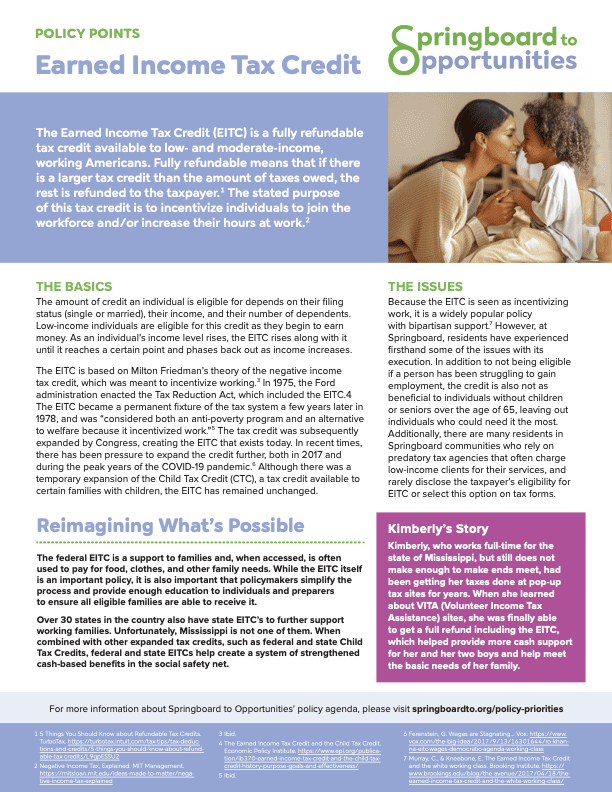POLICY POINTS
Earned Income Tax Credit
The Earned Income Tax Credit (EITC) is a fully refundable tax credit available to low- and moderate-income working Americans. Fully refundable means that if there is a larger tax credit than the amount of taxes owed, the rest is refunded to the taxpayer.* The stated purpose of this tax credit is to incentivize individuals to join the workforce and/or increase their hours at work.*
*5 Things You Should Know about Refundable Tax Credits. TurboTax. https://turbotax.intuit.com/tax-tips/tax-deductions-and-credits/5-things-you-should-know-about-refundable-tax-credits/L9gpESSU2
*Negative Income Tax, Explained. MIT Management. https://mitsloan.mit.edu/ideas-made-to-matter/negative-income-tax-explained
THE BASICS
The amount of credit an individual is eligible for depends on their filing status (single or married), their income, and their number of dependents. Low-income individuals are eligible for this credit as they begin to earn money. As an individual’s income level rises, the EITC rises along with it until it reaches a certain point and phases back out as income increases.
The EITC is based on Milton Friedman’s theory of the negative income tax credit, which was meant to incentivize working.3 In 1975, the Ford administration enacted the Tax Reduction Act, which included the EITC.4 The EITC became a permanent fixture of the tax system a few years later in 1978, and was “considered both an anti-poverty program and an alternative to welfare because it incentivized work.”5 The tax credit was subsequently expanded by Congress, creating the EITC that exists today. In recent times, there has been pressure to expand the credit further, both in 2017 and during the peak years of the COVID-19 pandemic.6 Although there was a temporary expansion of the Child Tax Credit (CTC), a tax credit available to certain families with children, the EITC has remained unchanged.
3 Ibid.
4 The Earned Income Tax Credit and the Child Tax Credit. Economic Policy Institute. https://www.epi.org/publication/ib370-earned-income-tax-credit-and-the-child-tax-credit-history-purpose-goals-and-effectiveness/
5 Ibid.
6 Ferenstein, G. Wages are Stagnating… Vox. https://www.vox.com/the-big-idea/2017/9/13/16301644/ro-khanna-eitc-wages-democratic-agenda-working-class
THE ISSUES
Because the EITC is seen as incentivizing work, it is a widely popular policy with bipartisan support.7 However, at Springboard, residents have experienced firsthand some of the issues with its execution. In addition to not being eligible if a person has been struggling to gain employment, the credit is also not as beneficial to individuals without children or seniors over the age of 65, leaving out individuals who could need it the most. Additionally, there are many residents in Springboard communities who rely on predatory tax agencies that often charge low-income clients for their services, and rarely disclose the taxpayer’s eligibility for EITC or select this option on tax forms.
7 Murray, C., & Kneebone, E. The Earned Income Tax Credit and the white working class. Brooking Institute. https://www.brookings.edu/blog/the-avenue/2017/04/18/the-earned-income-tax-credit-and-the-white-working-class/

Kimberly’s Story
Kimberly, who works full-time for the state of Mississippi, but still does not make enough to make ends meet, had been getting her taxes done at pop-up tax sites for years. When she learned about VITA (Volunteer Income Tax Assistance) sites, she was finally able to get a full refund including the EITC, which helped provide more cash support for her and her two boys and help meet the basic needs of her family.

